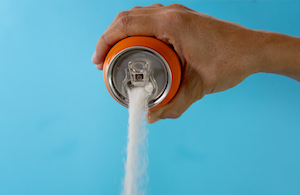
How’s your New Year’s resolution diet coming along? This is about the time people start to fall off the wagon, if it hasn’t happened already. Have you been craving sugar? Has the yummy sweetness been your downfall? Well take heed. Researchers are finding sugar to be as addictive as drugs and alcohol so you've got a mighty opponent to contend with.
A recent study published in Scientific Reports looked at the effects sugar can have on the brain.
“We were hoping to find out if sugar intake could lead to changes in the brain,” study author Anne M. Landau told us, “and if these changes were similar to those triggered by addictive substances.”
Sugar consumption has changed drastically over time. Whereas 200 years ago, the average person in the U.S. ate about two pounds of sugar annually, today we each, individually consume over 150 pounds of sugar per year. Where does all this added sugar come from? Mostly soft drinks.
Researchers studied dopamine and opioid neurotransmitter systems since these have been implicated in mechanisms of wanting and liking. There is a network of brain regions relevant to addiction and their theory was that they may observe changes in dopamine and opioid receptors in some of these regions in response to sugar.
“Sugar has always been my own vice,” Landau told us. “People are aware of the consequences and addictive potential of smoking, drinking, and drugs like cocaine. Sugar always seemed so innocent in comparison. The obesity epidemic is a great concern. Not only is it linked to a number of chronic diseases like type 2 diabetes and cardiovascular disease, but it can also impact brain function. Understanding the brain mechanisms of what can promote overeating can help us work towards prevention.”
A body mass index of 30 or higher means that someone is clinically obese according to the The Centers for Disease Control and Prevention. More than one in ten people in the world is considered to be clinically obese, representing five per cent of the global population. About 35 per cent of adults in the U.S. are obese which works out to more than one in three people. Men are more likely to be overweight than women in the U.S. A study that looked at children and obesity found that 17 per cent of the children studied were obese and nearly six per cent were extremely obese.
For the study, a brain imaging technique called PET (positron emission tomography) was used to get a glimpse of dopamine and opioid receptors in the brain. Researchers imaged the brains of a group of seven minipigs before and 12 days after adding water containing sugar to their diet. Minipigs are large omnivorous animals with areas of the brain relevant to the study more closely resembling a human brain than the usual test animal of rats.
The current study found changes in the dopamine and opioid receptor systems of the brain in areas relevant to drug addiction.
“It was surprising to see such a large impact of the mere addition of sugar to the diet,” Landau told us. “Our lifestyle choices and habits can have a large impact on our brains and behavior and our future chances of developing chronic diseases. We suggest sugar in moderation, since we can see rapid brain responses. We have to think carefully about how we feed ourselves, and more importantly, how we feed our children while their brains are still developing.”
Landau told us the data provides a piece of the puzzle, but without further studies, they cannot conclude that sugar is addictive.
“The takeaway message from our study is that sugar can alter the brain in ways similar to drugs of abuse, and this shows that sugar has the potential to be addictive, but does not guarantee addiction,” Laundau told us. “In addition to the imaging data we provided, behavioural studies, as well as investigations on the effects of withdrawal, are warranted.”
Patricia Tomasi is a mom, maternal mental health advocate, journalist, and speaker. She writes regularly for the Huffington Post Canada, focusing primarily on maternal mental health after suffering from severe postpartum anxiety twice. You can find her Huffington Post biography here. Patricia is also a Patient Expert Advisor for the North American-based, Maternal Mental Health Research Collective and is the founder of the online peer support group - Facebook Postpartum Depression & Anxiety Support Group - with over 1500 members worldwide. Blog: www.patriciatomasiblog.wordpress.com
Email: tomasi.patricia@gmail.com